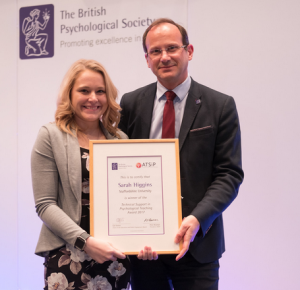We are delighted to welcome applications for a funded  PhD opportunity in the Staffordshire Centre for Psychological Research, Department of Psychology, for an anticipated September 2017 start date.
PhD opportunity in the Staffordshire Centre for Psychological Research, Department of Psychology, for an anticipated September 2017 start date.
The PhD project is titled “The role of social norms in reducing belief in conspiracy theories” and will be supervised by Dr Daniel Jolley (Principal Supervisor, Lecturer in Psychology), Dr Robert Dempsey (Lecturer in Psychology) and Dr Rachel Povey (Associate Professor in Health Psychology).
Project Background:
Belief in conspiracy theories is widespread in society. Whilst belief in conspiracy theories may fulfil needs such as control (e.g., Whitson, et al., 2015), they are potentially dangerous; exposure to conspiracy theories reduces people’s engagement in a variety of behaviours, including vaccinations (e.g., Jolley & Douglas, 2014a, 2014b). Examining tools to address conspiracy theories is therefore timely. Broadly speaking, this novel project will therefore build on existing research by exploring the relationship between perceived social norms and conspiracy beliefs and develop interventions that will help combat the effects of conspiracy theories.
This PhD project has three phases:
- a systematic literature review,
- empirical studies understanding the psychological mechanisms underlying social norms and conspiracy beliefs,
- the development of attitudinal and behaviour change interventions (e.g., improving vaccine uptake).
This three year funded PhD and includes a fee waiver equivalent to the home/EU rate and a tax-free stipend of £14,553 p.a. over the three years of the project. In addition to their PhD studies, the successful applicant will also deliver up to six hours per week of teaching or teaching-related support and will join the Staffordshire Centre for Psychological Research which provides a supportive research environment in the Department of Psychology.
We recommend that you make contact with the Principal Supervisor (Dr Daniel Jolley, daniel.jolley@staffs.ac.uk), to receive the full project outline and/or to enquire about this PhD opportunity.
Applications
Details on how to apply (alongside qualification requirements) for the funded PhD opportunity can be found here. Applications (a CV and a covering letter) need to emailed to the Staffordshire University Graduate School by 4th August 2017 (details and the email address for the Graduate School can be found here).
The Staffordshire Centre for Psychological Research is home to research activity in the Psychology Department at Staffordshire Centre. The Centre is home to a number of research-active psychologists who are engaged in research across a wide range of psychological subdisciplines. The Centre has two overarching research streams: Health and Behaviour Change and Applied Perception and Cognition.
https://www.youtube.com/watch?v=QROJn3W9bAw
The Centre provides training for PhD students, Research Masters degrees, as well as Professional Doctorates in Clinical and Health Psychology (click here for more details). The Centre also provides bespoke training to private and public organisations, as well as expertise for consultancy research opportunities. For more details about the Centre, its research activities, events and consultancy, please visit our website (click here).






 offers a range of
offers a range of 

 in the use of ‘smart study drugs’ by university students in the UK, Dr Robert Dempsey (Lecturer in Psychology & Co-director of the
in the use of ‘smart study drugs’ by university students in the UK, Dr Robert Dempsey (Lecturer in Psychology & Co-director of the 







